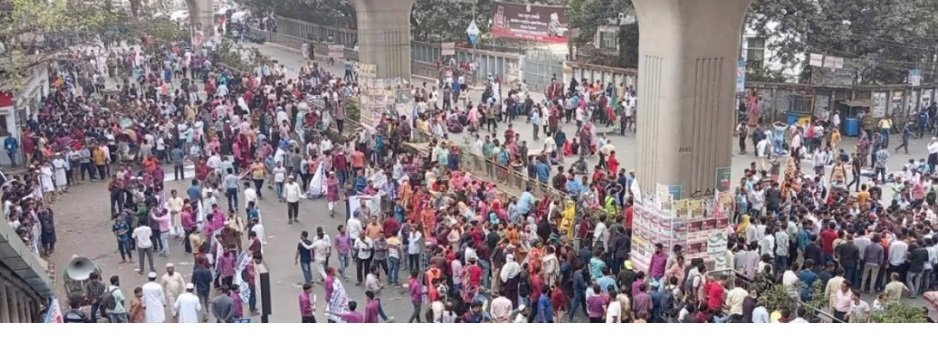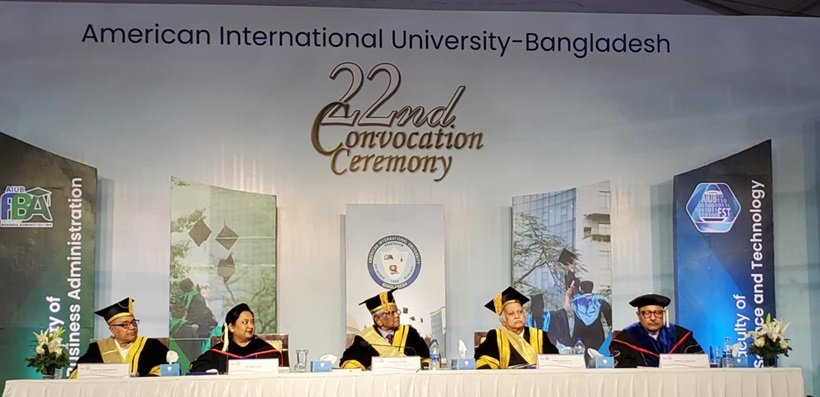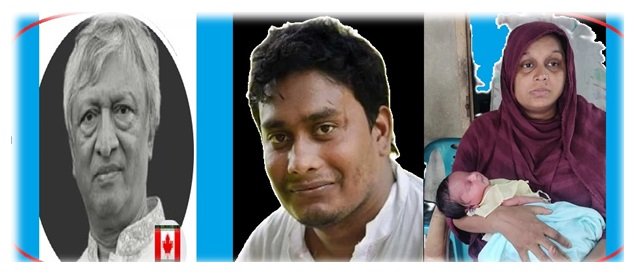Requirements not met
Your browser does not meet the minimum requirements of this website. Though you can continue browsing, some features may not be available to you.
Browser unsupported
Please note that our site has been optimized for a modern browser environment. You are using »an unsupported or outdated software«. We recommend that you perform a free upgrade to any of the following alternatives:
Using a browser that does not meet the minimum requirements for this site will likely cause portions of the site not to function properly.
Your browser either has JavaScript turned off or does not support JavaScript.
If you are unsure how to enable JavaScript in your browser, please visit wikiHow's »How to Turn on Javascript in Internet Browsers«.
Language / ভাষা:
Country News
Outsourcing Workers Block National Press Club Road, Demand Permanent Employment
- Details

Dhaka, February 22 – Employees of the Bangladesh Outsourcing Employees Welfare Council have staged a protest by blocking the road in front of the National Press Club, demanding permanent employment.
AIUB's 22nd Convocation Held
- Details

The 22nd convocation of American International University-Bangladesh (AIUB) was held.
The event was organized on Saturday, February 22, at the university's campus.
With the consent of the President and the university's Chancellor, Md. Shahabuddin, the Advisor to the Ministry of Finance and the Ministry of Science and Technology, Dr. Salehuddin Ahmed, presided over the convocation ceremony and distributed certificates among the graduates.
Languages matter: Silver Jubilee Celebration of International Mother Language Day
- Details

Languages matter: Silver Jubilee Celebration of International Mother Language Day
UNESCO will celebrate the 25th anniversary of International Mother Language Day, reaffirming the importance of linguistic diversity and multilingualism in fostering dignity, peace, and understanding.
The two-day event will feature technical dialogues (20 February), high-level sessions (21 February), cultural performances, and an exhibition celebrating global linguistic diversity, all accessible through live streaming and interpretation.
UNESCO estimates that there are 8,324 languages, spoken or signed. Out of these, around 7,000 languages are still in use. However, linguistic diversity is under threat, with many languages disappearing at an accelerated pace in our rapidly changing world.
Learning in one’s mother tongue enhances comprehension, engagement, and critical thinking, but 40% of learners lack this opportunity. Multilingual education addresses these gaps, boosting participation, retention, and socio-emotional development, while also supporting global goals like gender equality, climate action, and sustainable communities. UNESCO champions multilingualism as a powerful tool for inclusive education and meaningful global engagement.
In February, UNESCO will celebrate the 25th anniversary of International Mother Language Day, reaffirming the importance of linguistic diversity and multilingualism in fostering dignity, peace, and understanding. This milestone highlights decades of efforts to preserve mother tongues, safeguard cultural heritage, and improve education.
The "Languages matter: Silver Jubilee Celebration of International Mother Language Day" event will underscore the urgency of accelerating progress on linguistic diversity to build a more inclusive and sustainable world by 2030. It also supports the International Decade of Indigenous Languages, emphasizing the role of languages in achieving global development goals. The event will review progress, showcase successful multilingual education practices, and advocate for inclusive language policies that respect all communities.
Event
International Mother Language Day 2025
20 February 2025 - 10:00 am - 21 February 2025 - 6:00 pm
Location
UNESCO Headquarters, Paris, France
Rooms :
Room IIRoom VIIIRoom I
Type :
Cat IV – International Congress
Arrangement type :
In-Person
Mob Justice: Law Enforcement in Bangladesh as a Silent Spectator to Injustice and Jungle Law
- Details

Mob Justice: Law Enforcement in Bangladesh as a Silent Spectator to Injustice and Jungle Law
By Delwar Jahid
Mob justice, or vigilantism, refers to instances where groups of people take the law into their own hands to punish those accused of crimes, bypassing legal procedures and due process. In Bangladesh, this practice has become increasingly concerning, particularly since the student-led protests in August 2024. These protests have drawn widespread attention to issues of security, governance, and public accountability.
This phenomenon is not new. In August 2018, a movement led by students, triggered by the death of two students in a road accident in Dhaka, saw thousands take to the streets to demand safer roads and better enforcement of traffic laws. While these protests were largely peaceful, they highlighted widespread dissatisfaction with the rule of law in Bangladesh and revealed deep frustrations over corruption and a perceived lack of accountability among those in power.
Following these protests, there was a notable increase in reported incidents of mob justice across the country. Many citizens, disillusioned with the legal system, began to take matters into their own hands, believing that justice would not be served through official channels.
The Perceived Effectiveness of Mob Justice
Proponents of mob justice argue that it acts as a deterrent to crime, particularly in communities where law enforcement is seen as weak or corrupt. When there is a lack of trust in the police or the justice system, people may feel compelled to take justice into their own hands, believing this instant form of punishment to be more effective than the slow and often inefficient legal system.
The Negative Consequences of Mob Justice
However, the consequences of mob justice are overwhelmingly negative. It often leads to unjust punishment and retaliatory violence, sometimes resulting in the death of innocent people. Decisions are made in the heat of the moment, without proper investigation or evidence, denying the accused the opportunity to defend themselves and leading to miscarriages of justice.
Mob justice perpetuates a cycle of violence and fosters an environment of fear and insecurity. It undermines the rule of law, weakens institutions meant to uphold justice, and often exacerbates conflict, leading to greater social unrest.
A Case in Point: The Death of Abdullah Al Masood
A recent example illustrates the dangers of mob justice. Two days after the death of Abdullah Al Masood, a former leader of the Rajshahi University Chhatra League, no case had been filed regarding the attack that led to his death. On September 7, Masood, aged 31, was attacked near Rajshahi University and handed over to the police with serious injuries. He died later in the hospital. Despite a video showing Masood speaking after the attack, no witnesses have come forward, and the police have yet to receive a formal complaint from his family. Masood's family expressed concerns about legal action due to fears of reprisal. The Vice-Chancellor of Rajshahi University stated that the university was considering filing a case on the family's behalf. Masood, who became a father just days before his death, had previously been attacked in 2014, losing a leg and suffering serious injuries. His family remains in shock and fears they may never see justice. (Source: Prothom Alo, September 9, 2024)
The Need for Police Reform
In response to the growing concerns over mob justice and law enforcement's ineffectiveness, the Home Affairs Advisor recently informed the UNDP resident representative that a committee would soon be formed to outline the approach, process, and leadership for police reform. UNDP representative Stephen Lilal emphasized the importance of these reforms to build public confidence, reduce criticism of the police, and offered technical and financial support for the process. (Source: Daily Our Time, September 9, 2024)
Despite these promises of reform, the interim government has failed to protect minority communities, opposition party members, and even law enforcement officials themselves. Under the watchful eyes of law enforcement agencies, police stations have been looted, police officers killed, and government assets plundered, all while acts of vandalism have been disguised under the garb of military action.
Conclusion
While mob justice may seem like a quick solution to perceived crimes, history shows that it is ultimately ineffective and dangerous. It undermines the rule of law, perpetuates violence, and often leads to the wrongful punishment of innocent individuals. To effectively combat crime, Bangladesh must strengthen its legal and judicial institutions, improve law enforcement, and address the root causes of public distrust in the justice system. Only by doing so can the country build a more just and equitable society where all citizens feel secure and confident in the rule of law.
Author: Delwar Jahid, President of the Bangladesh North American Journalists Network, researcher, and analyst on human rights and law.
- Additional Resources:
- Additional Resources:
- Agro-Ocean
- Asian News and Views
- Bangabandhu Development and Research Institute
- Bangladesh North American Journalists Network
- Bangladesh Heritage and Ethnic Society of Alberta (BHESA)
- Coastal 19
- Delwar Jahid's Biography
- Diverse Edmonton
- Dr. Anwar Zahid
- Edmonton Oaths
- Motherlanguage Day in Canada
- Samajkantha News
- Step to Humanity Bangladesh











